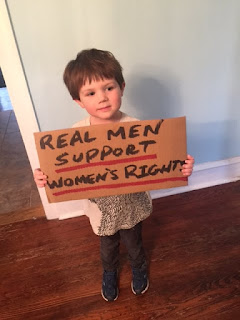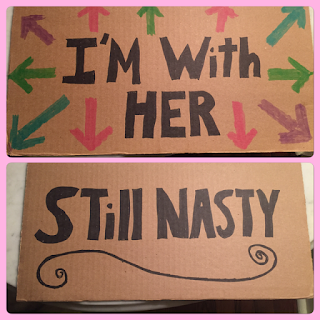We took Owen to the Women’s march in Philadelphia on Saturday, and it was a very positive experience. On Friday we made some signs:
On Saturday morning we got up at our usual weekday time, got ready, and after practicing a few call and response chants with Owen (You say dump! I say Trump! Dump Trump! Dump! Trump! And: we’re here, we’re nasty, get used to it!) which he did while marching in place, headed out the door at 8 to drive to the train. Owen was excited about the march, but he probably was most excited about going on the train. It had been awhile since we last took him on one, and it was long enough ago so that he had no memory of it. There were a lot of people at the station with signs waiting to get on the train, and when the first one came it was quite crowded. We had to stand! That is not unusual for septa of course, but it was unusual for Saturday morning.
The march was scheduled to start at 10, and we arrived in the city at 9 and went to the location where Planned Parenthood supporters were meeting. Once there, we picked up a pink sign:
Owen, although sitting, is serious about standing
up for Planned Parenthood. After all, he is a PP baby.
We had a good time watching the crowd gather and reading the signs – which were so clever and funny and spot on. There were tons about Trump’s small hands (keep your tiny orange paws off my laws), and in general such a variety of approaches. I kept chuckling over “Trump’s so vain, he probably thinks this march is about him” and enjoyed seeing some older folk with signs reading, “I can’t believe I still have to protest this shit.”
We were towards the front of the group when the march began, so once we got to where it ended at the art museum, we turned around and walked the other way. This was when I realized how much bigger the Philadelphia march was than had been expected. On Thursday they were thinking 20,000 would show and it ended up being over 50,000. As we walked away from the endpoint, we passed thousands and thousands of people marching, and queuing up to get to where the march began. And then when we went back down to the subway, there were still hundreds getting off trains and going to hear the speakers. There were tons of men and children and all in all it was such a hopeful, positive atmosphere.
I don’t expect the march to make much a difference to Trump himself, but I do think it might make a difference to the senators and representatives and to the march participants. It was so heartening to see all the protests in the cities all over the world standing up against Trump’s ignorance and bullying and hate. Not so fast, cheeto. We are watching and waiting and ready to act.






